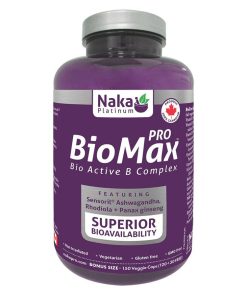Lorna Vanderhaeghe Mag Smart Raspberry 200G LORNA VANDERHAEGHE
$ 25,99 $ 15,59
Lorna Vanderhaeghe Mag Smart Raspberry 200G
- Vegan
- Gluten Free
- Non-GMO
- Dairy Free
- Canadian Brand
Magnesium is an abundant mineral in the body that is necessary for many organs and tissues to function properly. Eighty percent of Canadians are deficient in this important mineral. Deficiency has been implicated in cardiovascular disease, behavioral problems, diabetes, chronic fatigue, migraine headaches, muscular complaints, osteoporosis and PMS. We cannot get our daily requirement from food.
Cardiovascular Disease
Epidemiologic studies have linked low magnesium and the increased frequency of heart disease and cardiovascular deaths. High blood pressure is associated with low magnesium levels and simply adding magnesium will aid normalization of blood pressure, especially in women.
Behavioural Problems
Magnesium deficiency occurs more frequently in children with attention deficit hyperactivity disorder (ADHD) than in healthy children. Studies show that magnesium supplementation reduces ADHD symptoms in children. In one such study, a combination of magnesium and vitamin B6 was shown to reduce symptoms such as physical aggressiveness, instability, and poor attention at school in all study participants (52 children) after one to six months of treatment. Magnesium, together with vitamin B6, may also be beneficial for autistic patients. While no cure for autism is known, magnesium and B6 supplementation has led to remarkable improvement in many cases. MagsmartTM contains this combination.
Diabetes/Metabolic Syndrome
Magnesium plays a major role in the action of insulin. Magnesium supplements improve insulin response and glucose tolerance.
Chronic Fatigue
Studies have shown that up to 91 percent of 3,000 patients with chronic fatigue improved with magnesium and potassium supplementation. The beneficial effects were often seen after only four to five days of treatment.
Headaches/Migraine
Headaches due to muscle tension are associated with low magnesium. To evaluate the effects of supplemental magnesium, 81 patients with migraines (average attack frequency 3.6 per month) were given magnesium glycinate or placebo for 12 weeks. By weeks nine to 12, the attack frequency was reduced by 42 percent in the magnesium group compared to 16 percent in the placebo group.
Muscular Complaints
All muscles need magnesium to relax. A deficiency in magnesium increases muscle tension, muscle cramps, tics, restless leg syndrome, night muscle spasms and twitches.
Osteoporosis
Research indicates that magnesium is as important as calcium in the prevention and treatment of osteoporosis. Magnesium affects mineral metabolism in bone by a combination of effects on hormones and other factors that regulate bone health. Magnesium improves the action of cells that build bone and reduces the action of cells that break down bone.
Premenstrual Syndrome (PMS)
Several studies show magnesium is essential for the management of PMS (weight gain, swelling, breast tenderness, and abdominal bloating) and PMS-related mood changes.
Fast Shipping with Professional Packaging
Due to our longstanding partnership with UPS FedEx DHL as well as other top international carriers, we are able to offer a variety shipping options. Our warehouse staff are trained to pack your goods precisely according to the specifications we offer. Your items are carefully inspected and secured properly prior to shipping. Everyday, we send to thousands of customers in many countries. The fact that we are committed to becoming the biggest online retailer in the world is obvious. Both Europe and the USA have warehouses and distribution centers.
Note: Orders with more than one item are assigned a processing period in accordance with the item.
Before shipment, all ordered items will be thoroughly examined. The majority of orders will be sent within 48 hours. The delivery time is between 3-7 days.
Returns
Due to multiple parties which include the factory as well as the warehouse, we cannot fully manage stock. The actual levels of stock can change at any point. It's possible that you may not receive your order after it's been placed.
Our policy lasts thirty days. If it's been more 30 days since you made your purchase We're sorry to say that we can't offer you a complete exchange or refund.
The item must not be used and in its original condition. The item must be in its original packaging.
Related products
BONE BASICS
LACTOFERRIN-250
LION'S MANE
FISH OIL LEMON
MEMORY CARE
LION'S MANE
C+BIOFLAVONOIDS
ADVANCED MAGNESIUM COMPLEX
RESCUE PASTILLES
LION'S MANE
LION'S MANE
RXOMEGA-3 900MG
PS-300 PHOSPHATIDYLSERINE
LION'S MANE
PRO BIOMAX B COMPLEX
LION'S MANE TINCTURE
HIGH DOSE R-LIPOIC ACID
BIO-STRATH ORIGINAL
ORTHO BONE VEGAN
LION'S MANE
LION'S MANE
MEMORY BOOST
SMART GINKGO
ORG LION'S MANE POWDER
PRO-ADD




































